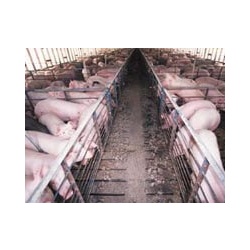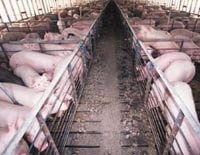
Decorah lawyer is promoting a new way to control CAFOs
Decorah attorney Karl Knudson says Iowa has had difficulty balancing the need for agricultural profits with the need to protect the public from pollution of air, groundwater and surface water caused by poorly regulated confined animal feeding operations (CAFOs).
So Knudson has developed a new response to CAFOs--one that he admits was "born out of frustration." He has worked with 42 farmers in Howard County to draw up restrictive covenants that limit future uses of their land and the land of neighbors who join the covenant. The work has created a nearly 9-square mile area where CAFOs will not have the fields they need to spread the manure that is a by-product of their operation.
Knudson says "We need to maintain a balance between the need to make a profit and the protection of our environment." He said he was contacted by the Howard County farmers--many of them Amish--because of complaints that their laundry smelled of manure and they could not open windows in the summertime.
The drive to get other Howard County farmers to join the restrictive covenants is continuing. Knudson says "Landowners may have a self-interest in creating self-imposed covenant restrictions due to shared concerns related to how large animal feeding operations can reduce property values, degrade drinking water and air quality, create intolerable odors or otherwise impact the local quality of life."
Knudson says other approaches have been tried to regulate CAFOS--and they have all failed. "There's been bipartisan failure," he concludes. He's hoping the restrictive covenant model can spread as a way to restore balance to agriculture in Iowa.
Site designed and maintained by Iroc Web Design Services©.
Your Small Business Web Design Solutions.™


